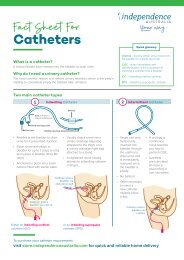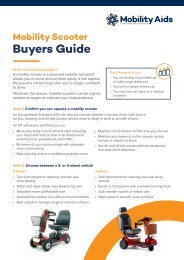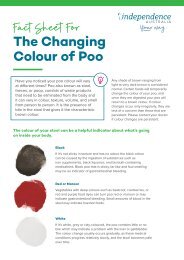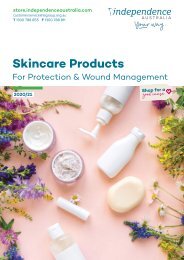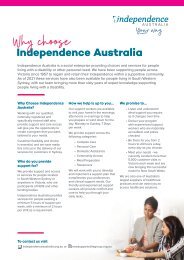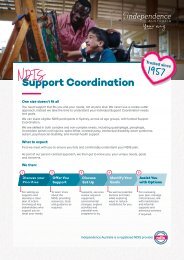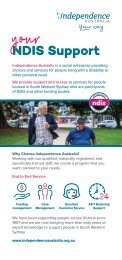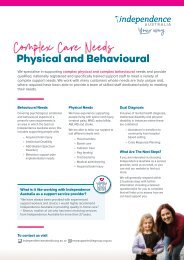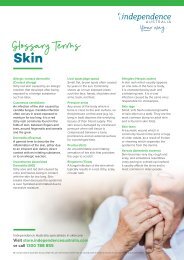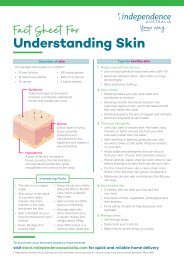Inform issue 26 – Summer 2019
This issue of Inform is all about closing odd 2018 and welcoming in a brand new year. We hear from Jarad, a presenter with Radio Adelaide about why he is bucking the 'people with disabilities cannot work' myth.
This issue of Inform is all about closing odd 2018 and welcoming in a brand new year. We hear from Jarad, a presenter with Radio Adelaide about why he is bucking the 'people with disabilities cannot work' myth.
Create successful ePaper yourself
Turn your PDF publications into a flip-book with our unique Google optimized e-Paper software.
Your health<br />
informonline.org.au<br />
23<br />
Getting too hot can be<br />
dangerous, especially when<br />
the person has trouble<br />
communicating their discomfort<br />
Whatever the reason, if you or a<br />
person you are caring for are at<br />
an increased risk from the heat<br />
of summer, there are a number of<br />
steps you can take to stay cool. It is<br />
important to know the signs of heatrelated<br />
distress, and how to avoid<br />
it, as in extreme cases becoming<br />
overheated can be life-threatening.<br />
Signs of heat-related distress:<br />
• Headache, nausea and fatigue are<br />
all signs of heat stress<br />
• Cool, moist skin; a weakened<br />
pulse and feeling faint are all signs<br />
of heat fatigue<br />
• Thirst, giddiness, weakness, lack<br />
of coordination, nausea, profuse<br />
sweating, cold and clammy skin,<br />
possible raised pulse, possible<br />
contracted pupils and possible<br />
vomiting are all signs that the body<br />
is getting too hot, which is known<br />
as heat exhaustion<br />
• If not treated, heat exhaustion can<br />
lead to heat stroke. Heat stroke<br />
is life-threatening and immediate<br />
medical attention is required.<br />
Symptoms can include confusion,<br />
combativeness, bizarre behaviour,<br />
faintness, staggering, rapid pulse,<br />
dry hot and flushed skin, lack of<br />
sweating, possible fast, shallow<br />
breathing and possible dilated<br />
pupils. Later stages can include<br />
delirium, seizures and coma.<br />
Getting too hot can be dangerous,<br />
especially when the person has<br />
trouble communicating their<br />
discomfort, so it’s important to know<br />
the signs ahead of time, and to take<br />
steps to remain cool during hot<br />
weather.<br />
Ways to stay cool in the heat:<br />
• Stay hydrated. Sip on cool drinks<br />
often. Water is best, but if you<br />
prefer fruit juice then water it down<br />
to improve hydration. Avoid drinks<br />
with alcohol, caffeine or excess<br />
sugar.<br />
• Stay out of the sun during the<br />
hottest part of the day, and if<br />
you have to go out cover up with<br />
loose, cool clothing and a hat.<br />
Natural fibers such as cotton will<br />
keep you cooler than polyester.<br />
• Take a cool shower or bath, or<br />
splash yourself with cool water.<br />
• Identify the coolest room you have<br />
access to ahead of time, so you<br />
know where to go in the heat.<br />
• Avoid turning on the oven or<br />
stove, as this will introduce heat<br />
into the house. Instead, opt for a<br />
cool, fresh meal, such as a proteinrich<br />
salad.<br />
• Check in with others. If you know<br />
someone who lives alone, or you<br />
yourself live alone, check in with<br />
others throughout heatwaves, to<br />
ensure everyone is staying safe<br />
and keeping cool.<br />
Other things to consider include<br />
checking medications to ensure<br />
they are being stored at a safe<br />
temperature, and putting them into<br />
a cooler room or even the fridge if<br />
it’s getting too hot inside the house.<br />
If you are ever concerned about<br />
how you will cope with the heat, or<br />
whether a medication will affect how<br />
your body responds to the heat you<br />
should have a chat with a medical<br />
professional, as they can help you<br />
make a plan. If you are worried that<br />
someone may be suffering from<br />
heat-related distress, it is important<br />
to seek medical attention urgently, as<br />
heat-related distress can become lifethreatening<br />
if not treated.<br />
Please note the information supplied is<br />
general in nature. Please consult your medical<br />
practitioner for individual advice.



